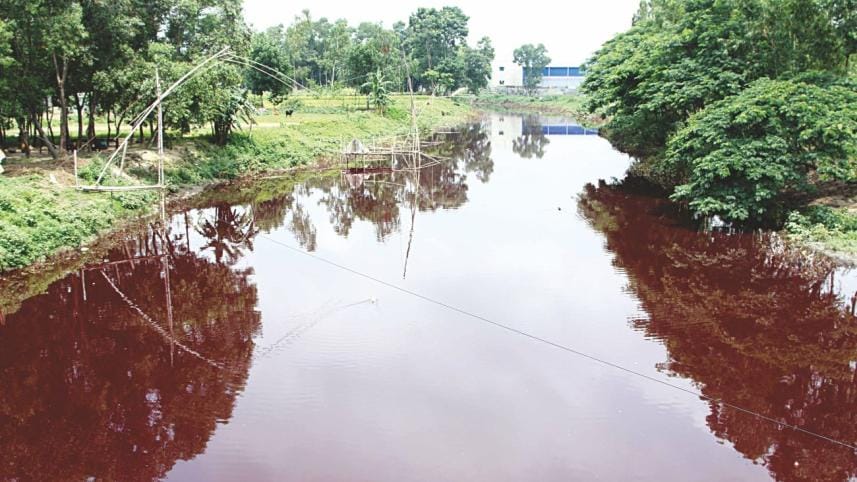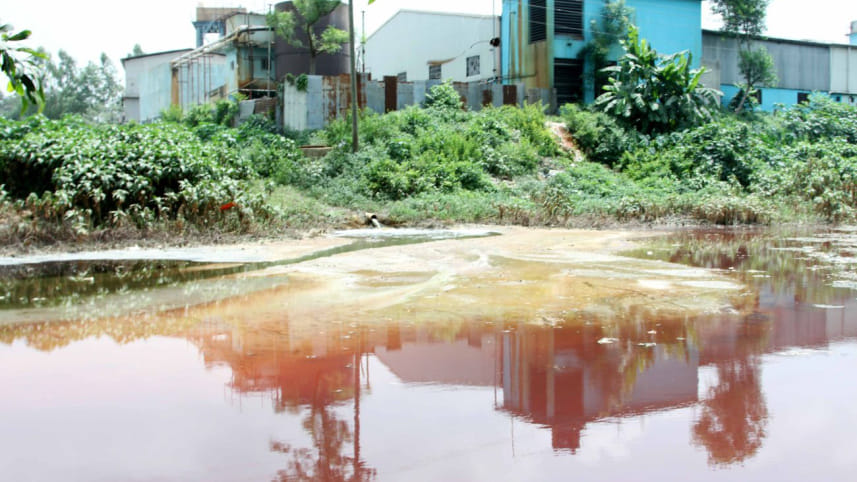Louhajang River: Palette of pollution


At a certain location, the Louhajang River occasionally changes its colour. Sometimes it turns red, sometimes yellow, and sometimes purple. But it is not out of some natural event. It is man-made.
Before 1995, when Alauddin Textile Mills was built on the bank of the river, the water was fresh and used for bathing, washing, and irrigating farms. Ever since then, the factory has been continuously releasing untreated waste into it.
Now the water is unfit for any use, say local villagers.
Alauddin Textile Mills sits on three acres of land, next to the river, at Khudirampur village in Tangail Sadar upazila.
While talking to this correspondent by the riverside, local farmer Jinnah Miah said, ”Before this factory was there, we could fish in the river throughout the year. We didn’t have to buy fish. Now you wouldn’t see even a frog.”
During a recent visit, it was seen that the river has turned red and spreads a pungent smell of chemicals. The pollution has affected several riverside villages -- Khudirampur, Karatia, Bhatkura, Taratia, and Gosaibari Kumulli.
The Louhajang is a distributary of the Dhaleshawari and runs 76km through Tangail town before emptying into the Bangshi River in Mirzapur upazila.
Alauddin Textile Mills is mainly a lungi factory and uses fabric dyes, which run into the river untreated and alter the hue of the water.
Locals say the contamination stretches as far as 2-3km.
As the pollution became more severe and started leaving impacts on agriculture, fishing and the lives of the riverside communities, local people launched protests. The campaign was stepped up in the last one decade.
Human chains were held, and public representatives and administration officials informed. They also visited the factory.

This time they would go to the High Court and block the Dhaka-Tangail highway if the pollution is not stopped, the villagers said.
The pollution is not only hurting the environment and wiping out aquatic life, it is also causing diseases to local residents.
Dr Azharul Islam, a retired government physician and skin disease specialist, has been one of the crusaders against the river pollution. The village he lives in is adjacent to the river and is one of the victims of the pollution.
He said the factory has been contaminating the river for the last two decades. “Whoever uses its water gets health problems especially skin diseases.”
Dr Azharul practices in Tangail town and in Dhaka. “I have treated several villagers who got skin diseases because of direct and indirect impacts of the pollution,” he said.
Cattle grazing along the river bank became affected, too.
Farmer Jinnah Miah said, “If our cattle drink the water, they get diarrhoea. We also cannot wash them in the river, which we used to do regularly in the past.”
Dr Azharul said, “We have been protesting for the last one decade. We informed the local chairman and urged the factory owners to stop the pollution. There has been no result because they are influential.”
After pressure mounted from local administration and environmentalists, the factory set up an effluent treatment plant (ETP) in 2007, said Somnath Lahiri, senior researcher of Bangladesh Environmental Lawyers Association (BELA), Tangail chapter. “But it was just an eyewash,” he said.
Mujahidul Islam, deputy director of Department of Environment (DoE) in Tangail, explains why.
“The factory was fined earlier for polluting the river. It’s true it has an ETP. But when we visited the factory a few days ago, we saw the factory was releasing the untreated waste through another pipeline bypassing the ETP.”
“They were also dumping solid waste,” he said on Thursday.
In July 2011, a mobile court led by Mohammad Munir Chowdhury, then director (monitoring and enforcement) of DoE, visited the spot along with experts and fined the factory Tk 30 lakh for not operating the ETP properly and causing pollution. The move failed as well.
Talking to The Daily Star, Dilip Kumar Saha, co-owner and managing director of Alauddin Textile Mills, refuted both allegations.
“We only release waste treated by the ETP. Still we shall further improve the ETP so that in no way can the factory harm the river,” he said.
When asked, Khalekuzzaman Chowdhury Maznu, chairman of Karatia union, where the factory is located, expressed helplessness.
He said he informed the matter to the DoE and the local administration several times. “What can I do if the authorities concerned do not take any action?”
Md Shahidul Islam, deputy commissioner in Tangail, who was travelling abroad, gave an interview to a private TV channel recently about the river pollution, saying he would engage the local office of DoE for monitoring and enforcement against the polluters as per environmental laws.
DoE official Mujahidul Islam said, “We collected all proofs of pollution including pictures during the recent spot visit and sent them to the enforcement unit of DoE. I hope the factory authorities won’t be able to escape action this time.”



 For all latest news, follow The Daily Star's Google News channel.
For all latest news, follow The Daily Star's Google News channel.
Comments